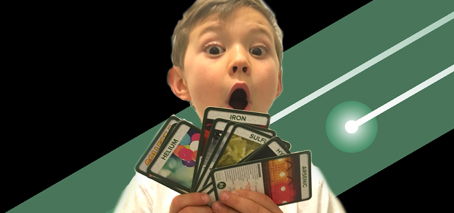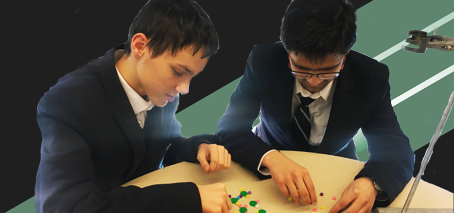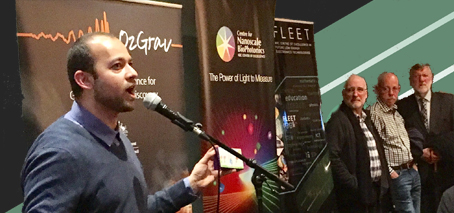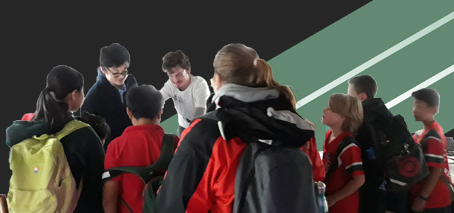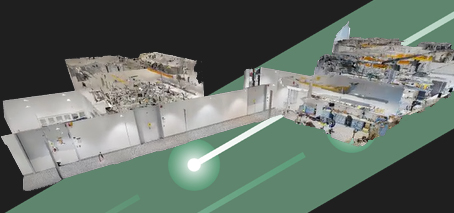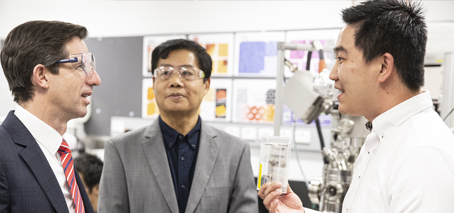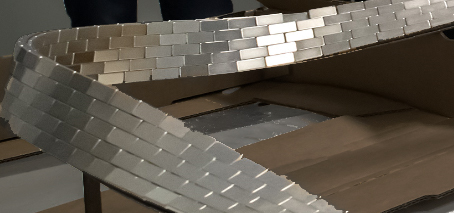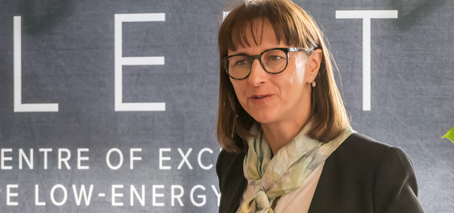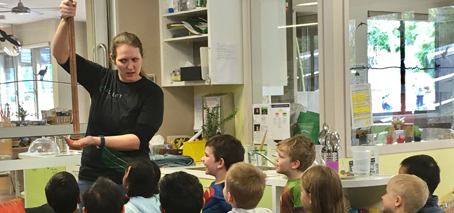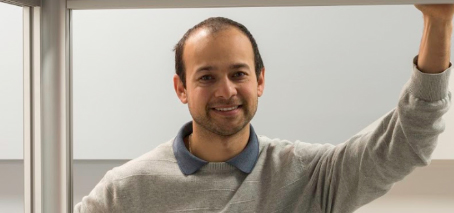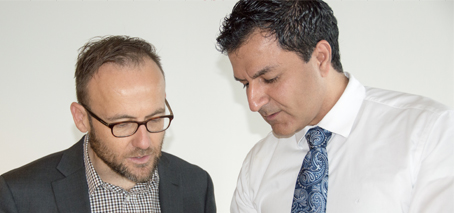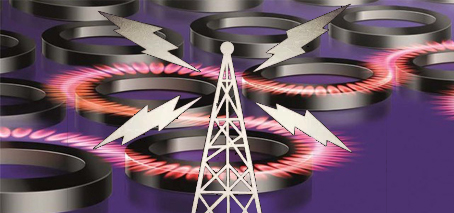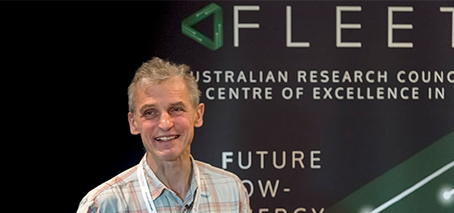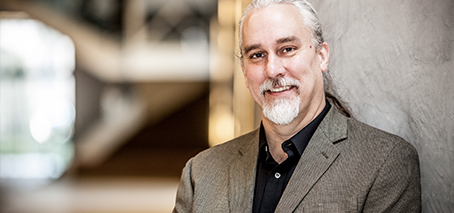FLEET’s Sam Bladwell (UNSW) was recently interviewed by Ian Woolf on Diffusion Radio, discussing the ICT energy issue that drives FLEET’s research as well as his own theoretical studies into spin. Listen to: Future low-energy electronics Battling jetlag, Sam describes spintronics and the need for low-energy electronics (from 6:35min) Spins and valleys Sam describes how his theoretical studies dovetail with …
FLEET/UNSW scientists sharing their passion for science: Science outreach in August
—by Cecilia Bloise, Node Coordinator, UNSW There’s nothing like a strong dosage of outreach to get the ‘cats out of the box’ into the public sphere. The FLEET Centre of Excellence invests significant resources into science-outreach, aimed to inspire stronger engagement with science across all levels of the community, from primary and secondary school students to the broader population. Beyond …
Introducing future electronics at secondary-school level
FLEET is currently helping to run a Year 10 ‘Future electronics’ course in partnership with John Monash Science School, Victoria. As well as covering the history of semiconductors and computing, and introducing students to Moore’s Law, the course will also be most students’ first introduction to quantum science, and will be Australia’s first introduction to superfluids and topological materials at …
Congratulations: Dianne Ruka, exceptional service award
Congratulations to FLEET’s outreach officer Dr Dianne Ruka, winning the Award for Exceptional Service to the Faculty of Science at Monash University. Dianne leads the education and training missions for FLEET across all seven collaborating universities, supporting staff and students across both Monash’s Science and Engineering Faculties, through science outreach programs. Since joining FLEET in 2017, Dianne has combined her …
COEs partner up for pitch training and physics on-stage
Three events last week allowed FLEET members to develop valuable, transferable communications and outreach skills, as well as providing a chance for FLEET to strengthen links with other ARC Centres of Excellence. A pitch training session for researchers from three ARC Centres introduced key communications concepts such as choosing the most effective lead, tailoring the pitch to the audience, presenting …
Flying the future-computing flag at Melbourne Knowledge Week
Over a dozen FLEET researchers flew the flag for FLEET and future computing at the recent Melbourne Knowledge Week showcase. Reps introduced the public to ICT energy use, electromagnetism, superconductivity (via FLEET’s supercooled Mobius track) , and the mechanics of binary operations that underlie all modern computing, via the Centre’s two Digicomputers. The superconducting track and Mobius track proved the …
Topological physics finds Famelab success
Congratulations to FLEET’s Sam Bladwell (right, UNSW), who won the NSW semifinal of Famelab, talking about study of electron spin, and will now compete in the finals in Perth on May 8th. Topological physics has done particularly well in this year’s Famelab, with FLEET associates Dr Semonti Bhattacharyya and Dr Antonija Grubisic-Cabo (Monash University) also qualifying for the Victorian semifinals. …
Live-streamed FLEET seminars
In 2018 FLEET began a series of live-streamed seminars to help share research results across the Centre, keep members informed on latest FLEET research, and enhance inter-node collaboration. Early-career researchers presenting the seminars gain valuable presentation experience, and benefit from feedback on their research from diverse Centre members. These seminars also provide an opportunity for regular get-togethers in each node, …
Schools outreach in 2018
Over the course of 2018, 16 FLEET members visited or hosted 22 schools, engaging students with relevant issues such as information and technology (ICT) energy use, how transistors work and the new fields of science studied at FLEET. Our visiting scientists were kitted out with an outreach toolkit developed in-house, including mechanical digicomputers to demonstrate binary operations, two-dimensional (2D) material …
Engaging with policymakers in 2018
Education Minister Simon Birmingham and ARC CEO Sue Thomas visited FLEET labs in may this year at the University of Wollongong’s (UOW’s) Innovation Campus. UOW node leader Prof Xiaolin Wang, Centre Deputy Director Prof Alex Hamilton (UNSW) and UOW researchers gave the Minister a quick introduction to ICT energy-use issues, topological insulators and atomically-thin materials, including a tour of labs …
Topological insulators are like a block of chocolates
Electrically, topological insulators resemble a chocolate block wrapped in foil: electrically insulating on the inside (the chocolate), but electrically conductive around the edges (the foil). It’s a very useful analogy to describe a new type of material, but we decided to test whether it’s actually correct. We tested four bars of chocolate, measuring the electrical resistance of the surrounding foil, …
Physicists tour FLEET-RMIT
FLEET’s RMIT labs recently hosted a tour by members of the Victorian branch of the Australian Institute of Physics, the country’s leading body for physics advocacy and support. The tour included the experimental laboratories and a briefing by RMIT node leader Prof Lan Wang, and AI Torben Daeneke, covering the research topics in Lan Wang’s group, Jared Cole’s group, JianZhen …
Supercool, superconducting Mobius track helps communicate FLEET science
A super-cooled, superconducting Mobius-track impresses the crowds, helps embed FLEET science As a cool science demo, FLEET’s superconductor Mobius track ticks all the boxes: liquid nitrogen – tick. Superconductor – tick. Cool shape – tick. Relevance to the science – tick tick tick. The track features 1500 neodymium magnets, fixed into the shape of a Mobius strip, so that a …
Launching low energy electronics: FLEET Launch 12 June
Our insatiable appetite for computing means ITC already consumes 5–8% of global electricity, and is doubling each decade. Unless that ever-growing demand for computing can continue to be met with efficiency gains, the information revolution will slow down from power hunger. At the launch of a new Australian Research Council Centre of Excellence the audience heard that efficiency gains in current, …
Macro-chips and electronic card games: challenging students
Fresh minds develop hands-on learning methods for schools FLEET is developing innovative ways to communicate physics to school students. A collaboration with Monash University Science allowed the Centre to enlist fresh brains to this communications challenge. A team of maths and physics students from Monash Bachelor of Science–Global Challenges took on the task of developing hands-on games and resources to demonstrate …
Agustin describes atomic-scale materials engineering on RRR
FLEET Chief Investigator Agustin Schiffrin spoke on science show Einstein a Go-Go about experimental physics at the atomic scale, and the study of exciting new nanomaterials with tailored electronic properties. Listen Agustin researches new nanomaterials with novel and exotic electronic properties, constructed of organic (carbon-based) molecules, sometimes inspired by bio-organisms. The team studies topological materials, which display a range of fascinating, …
Sharing a passion for science: outreach to schools
FLEET shares the responsibility to support students and teachers to increase participation in science, and in particular works towards increasing the number of girls and women participating in physics, chemistry and engineering. The Centre Launch on 12 June will showcase FLEET’s science outreach programs, educating the public and inspiring a new generation of scientists. Home Science and FLEET Geeks programs …
Carlos talks ultra-cold atoms and inspiring schoolkids to do science, RRR
FLEET postdoc Dr Carlos Kuhn described his field of ultra-cold atomic science and the fundamental discoveries made in an interview with RRR science show Einstein a Go-Go. The research will take a huge step forward this year with the commissioning of a new ARC-funded quantum-gas microscope, which will bridge the microscopic (atomic) and macroscopic (visible) worlds. Carlos also described his …
Rebecca Orrell-Trigg (RMIT) interview re liquid metal and 2D materials, RRR
FLEET PhD student Rebecca Orrell-Trigg (RMIT) uses liquid metals to synthesise 2D (atomically thin) materials for use in future ultra-low energy electronic devices. Late last year they developed a liquid metal “bubbling” method that was described as “ground breaking”, and have since refined this method to make it even more widely applicable. Rebecca’s interview covered the advantages of the new …
Building members’ outreach skills: 2018 Melbourne Knowledge Week
Melbourne Knowledge Week (May 2018) was an opportunity for FLEET to engage with the public and road-test a number of outreach demonstrations being developed for schools. It also gave 20 Centre members the opportunity to gain valuable experience in public science outreach, speaking to a diverse audience. Melbourne Knowledge Week showcases cool science and engineering projects in the city of …
Melbourne MP Adam Bandt visiting FLEET RMIT
An MP visit last week provided an opportunity to discuss future electronics, 2D materials and science policy. Melbourne MP and Greens Science/Energy spokesperson Adam Bandt was visiting FLEET’s labs at RMIT, hosted by FLEET RMIT node leader Kourosh Kalantar-Zadeh, and FLEET Director Michael Fuhrer. As well as FLEET researchers, Adam also got to meet our scientific counterparts from the Centre for …
Torben talks liquid metal with Subatomic, Radio Adelaide
“It’s so simple my retired parents could do this in their kitchen.” FLEET AI Torben Daeneke discussed deceptively-simple methods of depositing atomically-thin materials with Rohan Neagle, on Radio Adelaide’s Subatomic radio show. Torben’s interview also covered why 2D materials are key to ultra-low energy electronics, the mechanics of 2D deposition, the end of Moore’s Law and the massive amount of …
Micro branding: creating microscale and nanoscale FLEET banners
FLEET researchers taking an innovative, even ‘playful’, approach to their science have created a couple of unique and interesting branding displays for the Centre. >>>FLEET PhD student Fan Ji developed this micro-sized logo (right) at UNSW. The FLEET logo is etched onto the two-dimensional interface between two materials, in letters only a few thousandths of a millimetre high, using bias-assisted …
Michael Fuhrer talks more-accessible physics and better transistors on radio 2CC
FLEET Director Michael Fuhrer spoke Friday with ABC Radio 2CC Canberra’s Rod Henshaw about making physics more accessible, and FLEET’s search for better, ultra-low-energy transistors. Listen Prof Fuhrer was in Canberra for the International Physics Summer School on Topological Matter at ANU. Fuhrer discussed energy use in information and communications technology (ICT) and the alternatives that FLEET is pursuing, …
Launching FLEET Geeks: taking science to schools
Reaching schoolkids, and setting scientists up for outreach success Bringing practising scientists to schools brings enormous benefits. The FLEET Geeks program sees FLEET members performing science shows at primary schools and kindergartens, demonstrating physics with equipment not typically available to students. The program brings scientists to the students, allowing them to ask questions about scientific phenomena seen in the show, …
Ultracold science and benefits of a changeable career in science: Wolfgang Ketterle
Physics experiments at temperatures a billionth of outer space, and the benefits of flexibility in a science career. Nobel physics laureate Prof Wolfgang Ketterle told a crowd of around 200 at Swinburne University of Technology last week about Bose-Einstein condensates (BECs), and other strange states of matter that exist at nano-Kelvin temperatures, which open a new door to the quantum …
Science Says! and other outreach collaborations
FLEET supported the first Melbourne show of Science Says!, a science entertainment event run by The Science Nation, with FLEET’s A/Prof Meera Parish (Monash University) and Prof Chris Vale (Swinburne University of Technology) appearing on the panel at the Royal Society of Victoria. FLEET collaborated with Swinburne University of Technology, Monash University School of Physics and Astronomy, and the Australian …
Wolfgang Ketterle introduces Red to new states: ABC Radio Melbourne
“That’s not right!” Well, yes, it is. Prof Wolfgang Ketterle, in Australia with FLEET, teaches ABC Radio Melbourne’s Red Symons a thing or two about states of matter. In particular, Bose Einstein condensates. Listen below. Ketterle, in town for FLEET’s inaugural annual workshop in Torquay, is visiting the ultra-cold atomic labs at Swinburne today, where FLEET researchers use Bose-Einstein condensates …
FLEET hosts physicists tour at Monash
FLEET’s Monash labs recently hosted a tour by members of the Victorian branch of the Australian Institute of Physics, the country’s leading body for physics advocacy and support. The tour included the experimental laboratories of FLEET Chief Investigators Michael Fuhrer, Agustin Schiffrin, Kris Helmerson and Qiaoliang Bao. Members saw where: Michael Fuhrer grows atomically-thin (2D) materials in the lab using …
Michael Fuhrer’s STEM Talk
As part of National Science Week 2017, Prof. Michael Fuhrer participated in STEM Talks, organised by the Faculty of Education at Monash University, where he discussed his research on topological insulators, which won the 2016 Nobel Prize for Physics. The full talk (see the link below) covers the energy used in computation, now around 5% of global electricity, as well …


